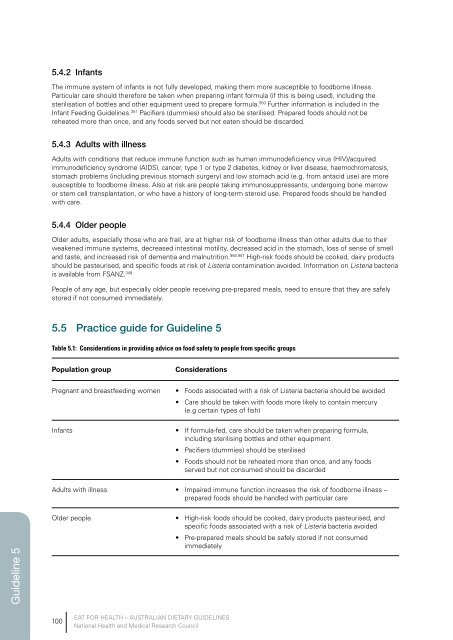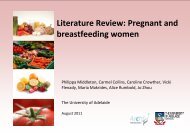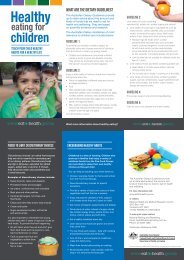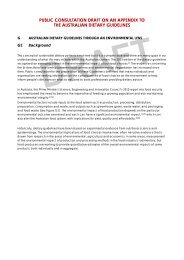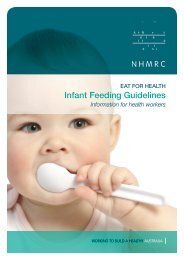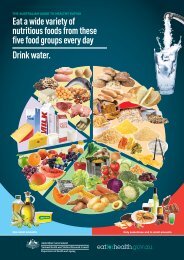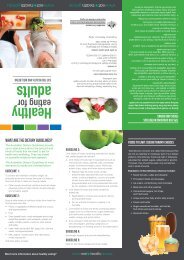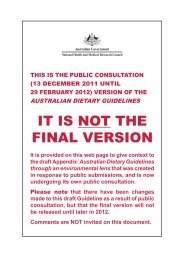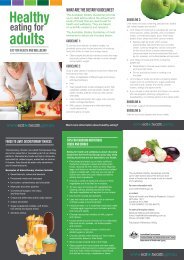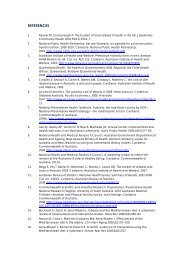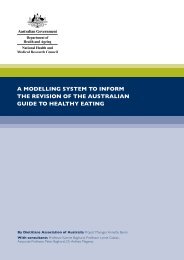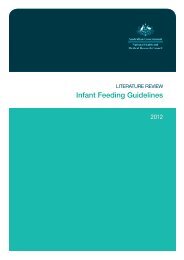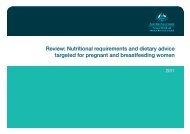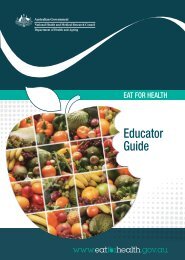Guidelines Dietary - Eat For Health
Guidelines Dietary - Eat For Health
Guidelines Dietary - Eat For Health
- No tags were found...
Create successful ePaper yourself
Turn your PDF publications into a flip-book with our unique Google optimized e-Paper software.
5.4.2 InfantsThe immune system of infants is not fully developed, making them more susceptible to foodborne illness.Particular care should therefore be taken when preparing infant formula (if this is being used), including thesterilisation of bottles and other equipment used to prepare formula. 950 Further information is included in theInfant Feeding <strong>Guidelines</strong>. 351 Pacifiers (dummies) should also be sterilised. Prepared foods should not bereheated more than once, and any foods served but not eaten should be discarded.5.4.3 Adults with illnessAdults with conditions that reduce immune function such as human immunodeficiency virus (HIV)/acquiredimmunodeficiency syndrome (AIDS), cancer, type 1 or type 2 diabetes, kidney or liver disease, haemochromatosis,stomach problems (including previous stomach surgery) and low stomach acid (e.g. from antacid use) are moresusceptible to foodborne illness. Also at risk are people taking immunosuppressants, undergoing bone marrowor stem cell transplantation, or who have a history of long-term steroid use. Prepared foods should be handledwith care.5.4.4 Older peopleOlder adults, especially those who are frail, are at higher risk of foodborne illness than other adults due to theirweakened immune systems, decreased intestinal motility, decreased acid in the stomach, loss of sense of smelland taste, and increased risk of dementia and malnutrition. 956,957 High-risk foods should be cooked, dairy productsshould be pasteurised, and specific foods at risk of Listeria contamination avoided. Information on Listeria bacteriais available from FSANZ. 349People of any age, but especially older people receiving pre-prepared meals, need to ensure that they are safelystored if not consumed immediately.5.5 Practice guide for Guideline 5Table 5.1: Considerations in providing advice on food safety to people from specific groupsPopulation groupConsiderationsPregnant and breastfeeding womenInfants• Foods associated with a risk of Listeria bacteria should be avoided• Care should be taken with foods more likely to contain mercury(e.g certain types of fish)• If formula-fed, care should be taken when preparing formula,including sterilising bottles and other equipment• Pacifiers (dummies) should be sterilised• Foods should not be reheated more than once, and any foodsserved but not consumed should be discardedAdults with illness • Impaired immune function increases the risk of foodborne illness –prepared foods should be handled with particular careGuideline 5Older people• High-risk foods should be cooked, dairy products pasteurised, andspecific foods associated with a risk of Listeria bacteria avoided• Pre-prepared meals should be safely stored if not consumedimmediately100EAT FOR HEALTH – australian dietary guidelinesNational <strong>Health</strong> and Medical Research Council


